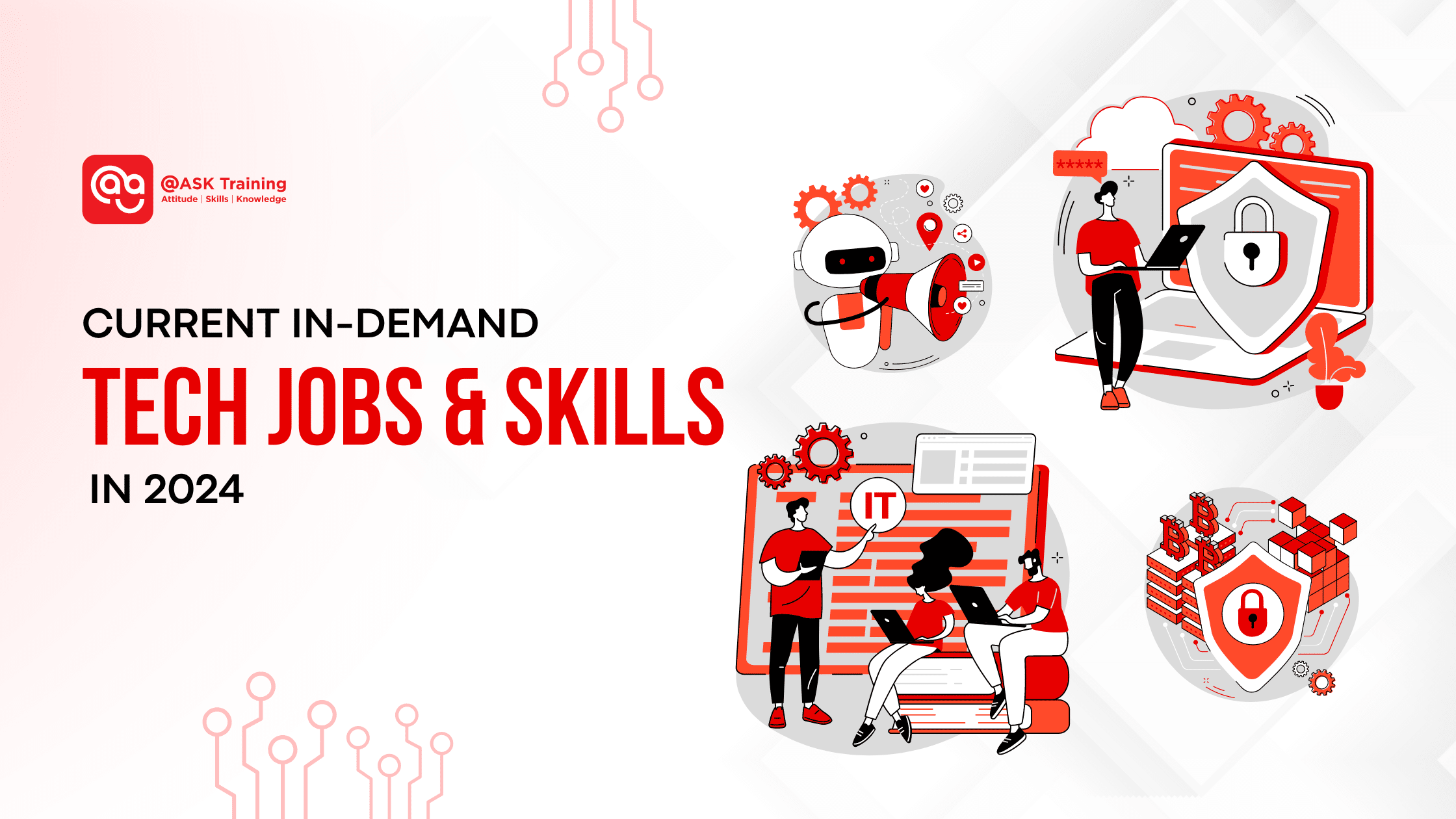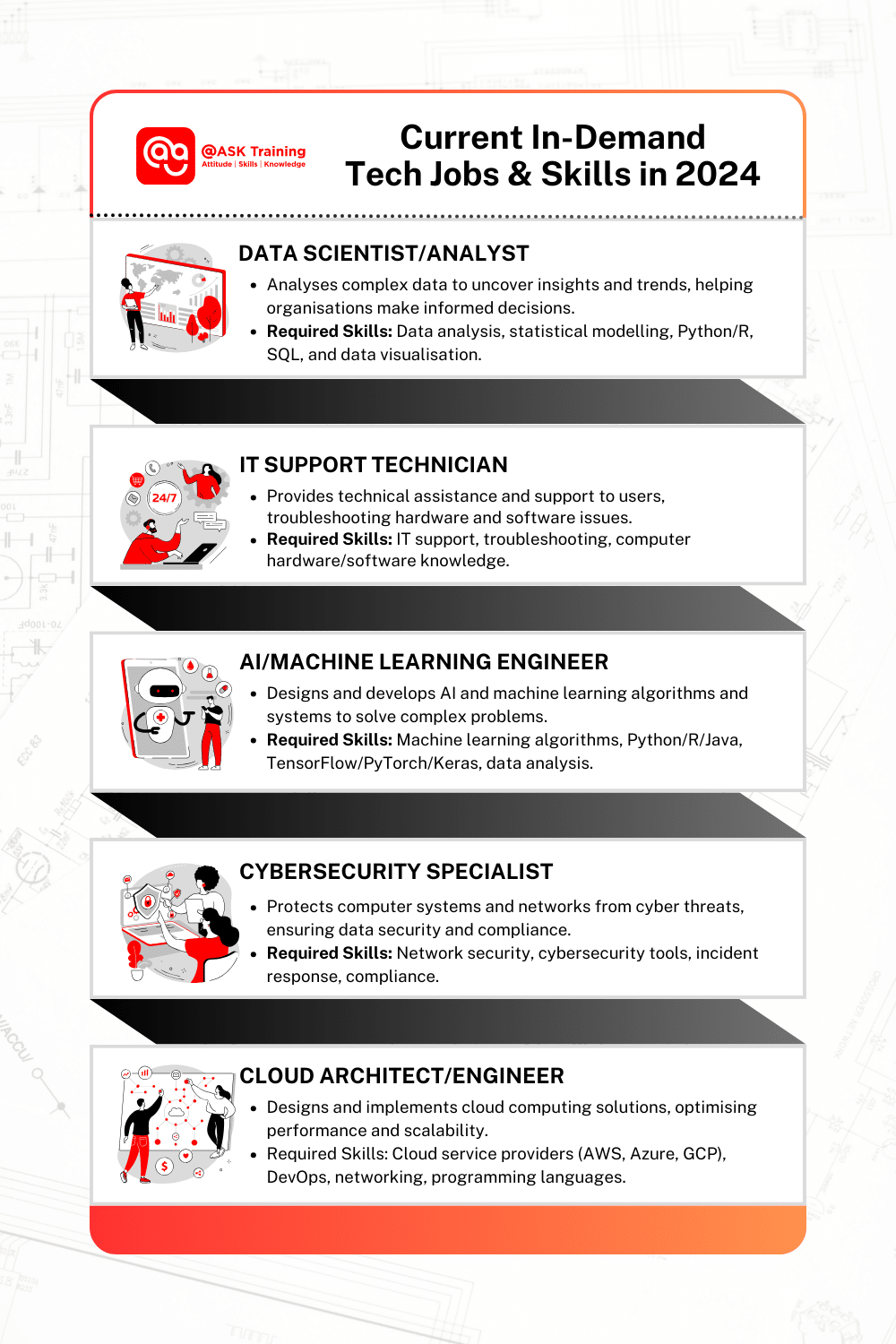
Are you a mid-career professional eyeing a switch to the IT sector? Singapore’s tech scene beckons with promising opportunities. In 2023, the country’s digital economy nearly doubled its contribution to the gross domestic product (GDP), reaching an impressive US$77.7 billion.
This surge is fueled by government initiatives like the Digital Government Blueprint, aimed at digitalising services and fostering a robust tech ecosystem. Moreover, Singapore attracted substantial tech funding, securing a share in Southeast Asia, totalling US$685 million in the first half of 2023 alone.
As we stride into 2024, the demand for skilled tech talent, particularly in cybersecurity, data science, and artificial intelligence (AI), is projected to soar. Technologies like blockchain and AI are becoming more popular, driving the industry forward.
Companies are also creating new roles like Chief Data Officer, where data is used to make important business decisions.
Another exciting trend is the increasing demand for contract workers in the IT sector. Experts in AI and cloud migration are especially sought after.
If you’re thinking about diving into the tech world, now’s the perfect time!
Join us as we explore how you can thrive in Singapore’s vibrant tech scene, discover the skills that are in demand, and find out how you can be part of this exciting journey.
Overview of the Current Tech Job Market in Singapore
As of 2024, the tech job market in Singapore is experiencing robust growth and expansion, fueled by various factors that contribute to the city-state’s position as a leading tech hub in the region.
Growth and Expansion of the IT Sector
According to recent statistics from the Ministry of Trade and Industry (MTI), Singapore’s IT sector has been experiencing steady growth, with a year-on-year increase in job opportunities and investments.
The tech industry has significantly contributed to Singapore’s economy, accounting for a substantial portion of GDP and employment.
Emerging Technologies Shaping Job Demand
Emerging technologies such as artificial intelligence (AI), data analytics, blockchain, and the Internet of Things (IoT) are driving job demand across various sectors.
Singapore’s Smart Nation initiative and Digital Economy Blueprint are driving the adoption of these technologies, creating a demand for skilled professionals to drive digital transformation initiatives.
Key Factors Influencing Job Trends in 2024
Digital Transformation Initiatives
Companies across industries are prioritising digital transformation to stay competitive in the digital age. This has increased demand for tech professionals who can implement and manage digital solutions.
Remote Work and Flexible Work Arrangements
The COVID-19 pandemic has accelerated the adoption of remote work and flexible work arrangements. As a result, there is a growing demand for tech professionals who are proficient in remote collaboration tools and cybersecurity.
Focus on Cybersecurity
With the rise in cyber threats and data breaches, cybersecurity has become a top priority for businesses and government agencies. There is a high demand for cybersecurity specialists who can protect digital assets and mitigate cyber risks effectively.
Top In-Demand Tech Jobs in 2024 for Mid-Career Professionals
1. Data Scientist/Data Analyst
Data scientists and data analysts are like detectives of the digital world. They dig deep into mountains of data to uncover valuable insights that help businesses make smart decisions.
Using fancy tools and clever tricks, they find patterns and trends that others might miss, turning raw data into actionable information.
Role Description and Responsibilities:
- Analyse complex data sets to extract insights and inform business decisions.
- Develop statistical models and algorithms to solve business problems.
- Collaborate with cross-functional teams to understand data requirements and provide actionable recommendations.
Skills In-Demand:
- Technical Skills: Proficiency in programming languages such as Python, R, or SQL is essential. Additionally, experience with data analysis tools like Excel, Tableau, or Power BI is highly valued.
- Data Analysis and Visualisation: Strong abilities in data analysis, visualisation, and storytelling are crucial. Familiarity with statistical modelling and machine learning techniques adds significant value to the role.
- Communication: Effective communication and presentation skills are key to conveying complex data insights to technical and non-technical audiences.
- Domain Knowledge: While not always mandatory, familiarity with specific industries or domains like finance, healthcare, or marketing can be advantageous.
Salary Range and Current Jobs Available:
- Average Monthly Salary: SGD 6,000 to SGD 6,100 (depending on experience and qualifications).
- Current job titles: Data Scientist, Data Analyst, Business Intelligence Analyst.
2. IT Support Technician
IT support technicians are the problem solvers of the tech world. They’re the go-to folks when your computer decides to act up or your email stops working.
With their tech know-how and friendly demeanour, they swoop in to fix issues and keep everything running smoothly so you can get back to work without missing a beat.
Role Description and Responsibilities:
- Provide technical assistance and support to end-users for hardware and software issues.
- Install, configure, and troubleshoot computer systems and peripherals.
- Maintain documentation and knowledge base for common technical problems and solutions.
Skills In-Demand:
- Troubleshooting and Problem-Solving: Strong problem-solving and analytical skills are frequently highlighted in job postings as essential qualities for IT support technicians.
- Technical Support: Providing top-notch technical support and assistance is a fundamental requirement in many IT support roles.
- Computer Hardware and Software Knowledge: Basic technical knowledge of computer hardware and software is often listed as a prerequisite in job postings for IT support technicians.
- Network Systems Maintenance: Responsibilities typically include maintaining computer and network systems, making this skillset crucial for IT support technicians.
Salary Range and Current Jobs Available:
- Average Monthly Salary: SGD 3,000 to SGD 4,200 (depending on experience and qualifications).
- Current job titles: IT Support Technician, Helpdesk Support Specialist.
3. Artificial Intelligence/Machine Learning Engineer
AI and machine learning engineers are like wizards of the digital realm. They work their magic to create smart systems that can learn and adapt on their own.
From predicting customer behaviour to automating tasks, they use their tech skills to make the impossible possible and bring science fiction dreams to life.
Role Description and Responsibilities:
- Design, develop, and deploy machine learning models and algorithms.
- Optimise and fine-tune existing machine learning systems for performance and scalability.
- Collaborate with data scientists and software engineers to integrate AI solutions into existing products and services.
Skills In-Demand:
- Technical Skills: Proficiency in programming languages like Python, R, or Java is essential. Additionally, experience with machine learning frameworks such as TensorFlow, PyTorch, or Keras is highly valued.
- Machine Learning Algorithms: Knowledge of various machine learning algorithms, including supervised and unsupervised learning, deep learning, and reinforcement learning, is crucial.
- Data Analysis and Visualisation: Strong skills in data analysis, visualisation, and storytelling are essential, along with knowledge of statistical modelling and data pre-processing.
- Communication: Effective communication and presentation skills are necessary to convey complex technical information to both technical and non-technical stakeholders.
- Domain Knowledge: While not always mandatory, familiarity with specific industries or domains like finance, healthcare, or marketing can be beneficial.
Salary Range and Current Jobs Available:
- Average Monthly Salary range: SGD5,00 to SGD7,000 (depending on experience and qualifications).
- Current job titles: Machine Learning Engineer, AI Engineer, Data Scientist (with specialisation in AI/ML).
4. Cybersecurity Specialist
Cybersecurity specialists are the digital guardians of the modern world. They’re the ones keeping hackers and cybercriminals at bay, protecting sensitive data and valuable assets from online threats.
With their keen eye for detail and knack for staying one step ahead, they ensure that digital fortresses remain secure and impenetrable.
Role Description and Responsibilities:
- Identify and assess cybersecurity risks and vulnerabilities in IT systems and networks.
- Implement security measures and controls to protect against cyber threats and attacks.
- Conduct security audits, penetration testing, and incident response activities.
Skills In-Demand:
- Technical Skills: A strong foundation in network security, encompassing firewalls, intrusion detection systems, and virtual private networks (VPNs). Proficiency in cybersecurity tools like SIEM systems, antivirus software, and penetration testing tools is essential. Additionally, expertise in cryptography and encryption protocols is required to safeguard data and communications. Understanding cloud security principles rounds out the skill set, ensuring knowledge of best practices for securing cloud environments.
- Cybersecurity Frameworks: Familiarity with industry-standard cybersecurity frameworks such as NIST Cybersecurity Framework, ISO/IEC 27001, and CIS Controls.
- Incident Response: Ability to detect, analyse, and respond to security incidents promptly and effectively. Experience in conducting forensics investigations and root cause analysis to identify the source of security breaches.
- Threat Intelligence: Knowledge of cyber threats and vulnerabilities, including malware, phishing, and social engineering techniques. Proficiency in threat intelligence analysis to proactively identify and mitigate potential security risks.
- Compliance and Regulation: Understanding of regulatory requirements and compliance standards relevant to cybersecurity, such as GDPR, HIPAA, and PCI DSS.
Salary Range and Current Jobs Available:
- Average Monthly Salary range: SGD4,800 to SGD5,900 (depending on experience and qualifications).
- Current job titles: Cybersecurity Specialist, Information Security Analyst, Security Operations Center (SOC) Analyst.
5. Cloud Architect/Engineer
Cloud architects and engineers are the architects of the virtual sky. They design and build digital clouds where data and applications can soar freely.
With their expertise in cloud technologies, they create scalable and secure environments that empower businesses to innovate and thrive in the digital age.
Role Description and Responsibilities:
- Design and implement cloud-based solutions and architectures for scalability, reliability, and security.
- Configure and manage cloud infrastructure using platforms like AWS, Azure, or Google Cloud Platform.
- Ensure compliance with regulatory requirements and best practices in cloud security and governance.
Skills In-Demand:
- Cloud Service Providers: Knowledge of various cloud service providers, such as Amazon Web Services (AWS), Microsoft Azure, or Google Cloud Platform (GCP).
- Development and Operations Skills (DevOps): Understanding of DevOps best practices and tools like Jenkins, Docker, and Kubernetes.
- Networking: Knowledge of networking concepts, including containerisation and virtualisation.
- Programming Languages: Proficiency in programming languages like Python, Java, and SQL.
- Cloud Security: Understanding of cloud security protocols and best practices.
- Communication Skills: Excellent communication skills in conveying technical information to stakeholders.
- Critical Thinking Skills: Ability to think critically and solve complex problems.
- Leadership Capabilities: Familiarity with leadership skills, such as delegating duties and mentoring junior engineers.
- Artificial Intelligence (AI) and Machine Learning (ML): Basic understanding of AI and ML concepts and their applications in cloud computing.
Salary Range and Current Jobs Available:
- Average Monthly Salary range: SGD4,000 to SGD7,000 (depending on experience and qualifications).
- Current job titles: Cloud Architect, Cloud Engineer, Solutions Architect (with expertise in cloud technologies).
Emerging Tech Roles & Skills for 2025 [Updated]
As we look ahead to 2025, the tech landscape continues to evolve, bringing with it new roles and expanded skill requirements.
While the jobs listed earlier remain in demand, emerging technologies like AI, cloud computing, and quantum computing are creating exciting new opportunities.
Here’s a look at some of the most promising emerging tech roles and the skills you’ll need to thrive in them.
1. AI Ethics & Compliance Specialist
As artificial intelligence becomes more integrated into business operations, regulatory scrutiny is increasing.
Companies are now seeking professionals who can ensure that AI systems are ethical, compliant, and free from bias. AI Ethics & Compliance Specialists play a critical role in navigating the complex landscape of AI governance.
Role Description:
AI Ethics & Compliance Specialists are responsible for ensuring that AI systems adhere to ethical standards and regulatory requirements. They work closely with data scientists, engineers, and legal teams to audit AI models, mitigate biases, and ensure transparency in AI decision-making processes.
Skills Needed:
- AI Governance & Compliance Frameworks: Familiarity with frameworks like GDPR, CCPA, and emerging AI-specific regulations.
- Ethical AI Principles: Understanding of ethical AI principles, including fairness, accountability, and transparency.
- Bias Mitigation: Experience with techniques to identify and mitigate bias in AI models.
- AI Model Auditing & Explainability Tools: Proficiency in tools like IBM AI Fairness 360, Google’s What-If Tool, and LIME for model auditing and explainability.
2. Cloud Security Engineer
With the rapid adoption of cloud computing, securing cloud infrastructures has become a top priority for businesses. Cloud Security Engineers are in high demand to protect sensitive data, ensure compliance, and mitigate cyber threats in cloud environments.
Role Description:
Cloud Security Engineers design and implement security measures to protect cloud-based systems and data. They are responsible for configuring secure cloud architectures, monitoring threats, and responding to security incidents in real-time.
Skills Needed:
- Cloud Security Expertise: Knowledge of Zero Trust Architecture, Identity and Access Management (IAM), and Kubernetes Security.
- Threat Detection & Incident Response: Ability to identify and mitigate security breaches effectively using tools like AWS GuardDuty, Azure Security Center, and Google Cloud Security Command Center.
- Compliance & Risk Management: Understanding of regulatory standards like ISO 27001, SOC 2, and PCI DSS to ensure cloud security meets industry requirements.
3. Quantum Computing Engineer
Quantum computing is no longer just a theoretical concept—it’s becoming a reality. As companies explore its potential applications in fields like cryptography, optimisation, and drug discovery, Quantum Computing Engineers are needed to develop and implement quantum algorithms.
Role Description:
Quantum Computing Engineers work on the cutting edge of technology, developing quantum algorithms and programming quantum computers. They collaborate with researchers and industry experts to solve complex problems that are beyond the capabilities of classical computing.
Skills Needed:
- Quantum Algorithms & Mechanics: Strong background in quantum mechanics and algorithm design.
- Quantum Programming Frameworks: Experience with frameworks like Qiskit (IBM), Cirq (Google), and Rigetti Forest.
- Cryptographic Implications: Understanding of how quantum computing impacts cryptography, including post-quantum cryptographic methods.
How to Prepare for These Emerging Roles
To position yourself for these exciting new opportunities, consider the following steps:
- Upskill in Emerging Technologies: Enrol in specialised courses or certifications in AI ethics, cloud security, or quantum computing.
- Stay Informed: Follow industry trends and advancements by attending webinars, reading research papers, and participating in tech communities.
- Gain Hands-On Experience: Look for internships, projects, or entry-level roles that allow you to apply your new skills in real-world scenarios.
The tech industry is constantly evolving, and 2025 promises to bring even more exciting opportunities. Let’s explore strategies to develop in-demand tech skills.
Strategies for Developing In-Demand Tech Skills
Navigating the ever-evolving tech landscape can be daunting, especially for mid-career professionals looking to stay relevant and competitive in Singapore’s dynamic job market.
However, with the right strategies and resources, developing in-demand tech skills becomes an achievable goal. Below, we’ll explore actionable steps to help you navigate this journey and position yourself for success in the fast-paced world of IT.
Let’s dive in!
Utilise the Skills Framework for ICT
Leverage the Skills Framework
Take advantage of the Skills Framework for Infocomm Technology (SFw) developed by IMDA and SSG. This comprehensive framework outlines the technical and generic skills required for various ICT job roles in Singapore.
Identify Skills and Career Pathways
Use the SFw to identify the specific skills needed for your desired tech career path. Whether you’re interested in software development, cybersecurity, or network engineering, the framework provides valuable insights into emerging skills and career progression opportunities within the IT sector.
Focus on In-Demand Skills
Prioritise Key Areas
In today’s tech landscape, skills in AI, data science, and cybersecurity are in high demand. Focus your skill development efforts on mastering these sought-after areas to align with current job market trends in Singapore.
Stay Relevant
Keep a pulse on the latest industry trends and technologies shaping the IT sector. By staying informed and adapting your skillset accordingly, you can enhance your employability and stay competitive in the job market.
Embrace Continuous Learning
Cultivate a Lifelong Learning Mindset
Embrace the idea of continuous learning as a cornerstone of career growth. With initiatives like the , the Singaporean government encourages individuals to upskill and reskill throughout their careers.
Pursue Relevant Training
Enrol in relevant courses, certifications, and training programs to enhance your tech skills. Training providers like @ASK Training offer designed to equip you with the latest industry knowledge and practical skills.
These courses are train-and-place programmes that will provide career assistance such as job placement opportunities, building up your CV, mentorship and more, upon graduation.
Stay Updated
Keep abreast of the latest advancements in technology and industry trends. Follow industry blogs, attend webinars, and participate in networking events to stay informed and connected within the tech community.
Explore Job Opportunities
Tap Into Job Portals
Keep a close eye on job portals like Indeed and MyCareersFuture to identify specific IT roles in demand. Pay attention to job descriptions and requirements to tailor your skill development efforts accordingly.
Start Small
Consider entry-level roles like Helpdesk jobs as stepping stones into the IT industry. These roles provide valuable hands-on experience and opportunities for growth, allowing you to build a solid foundation for your tech career journey.
Summary
If you have read this far, let’s recap. We’ve explored actionable strategies for mid-career professionals to develop in-demand tech skills and thrive in Singapore’s dynamic IT sector.
From leveraging frameworks like the Skills Framework for ICT to embracing continuous learning and exploring job opportunities, there are ample avenues to enhance your expertise and stay competitive in the digital age.
As you embark on your journey to upskill and reskill, remember to stay curious and adaptive. The tech industry is ever-evolving, and maintaining a growth mindset is key to navigating its twists and turns.
Embrace new challenges, stay informed about emerging technologies, and continue to invest in your professional development.
In 2024, Singapore’s IT sector holds exciting opportunities for those willing to seize them. With initiatives like the SkillsFuture Level-Up Programme and a thriving tech ecosystem, the city-state offers a conducive environment for individuals to thrive and excel in their tech careers.
Are You Ready to Be An IT Professional?
As you chart your course in the tech world, keep exploring, keep learning, and keep pushing the boundaries of what’s possible.
The future of IT in Singapore is bright, and with your skills and determination, the possibilities are limitless.
Don’t forget to check out @ASK Training’s certifications and enjoy up to 95% SkillsFuture Funding. We also offer SkillsFuture Career Transition Programme to support your career switch with our range of IT certifications:
- Certificate in Infocomm Technology (Infrastructure and Operations)
- Advanced Certificate in Infocomm Technology (Infrastructure and Operations)
- Diploma in Infocomm Technology (Infrastructure and Operations)
Gain post-graduation support when you join our IT SCTP programme which includes personalised career coaching, industry-specific training, and job placement opportunities.
Happy learning and here’s to a rewarding journey in Singapore’s vibrant IT landscape!






